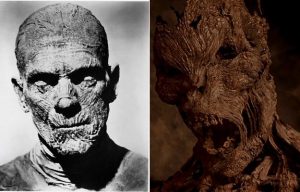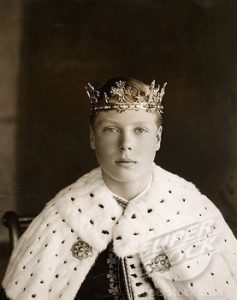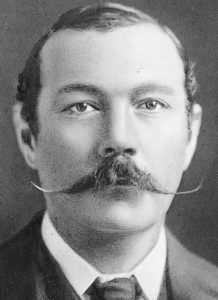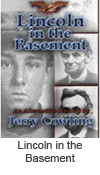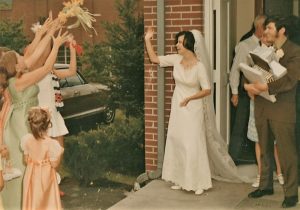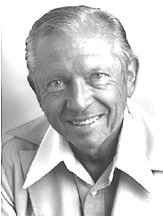
Don Pierce, the boss at Starday Records
Previously in the book: Nebraskan Hal Neely began his career touring with big bands and worked his way into Syd Nathan’s King records, producing rock and country songs. Along the way he worked with James Brown, the Godfather of Soul, who referred to Neely as his favorite uncle.
After the burial of Syd Nathan on March 7 at Judah Torah Cemetery in Cincinnati, maneuverings began for control of King Records. “Many prospective buyers have been trying to purchase King,” Billboard Magazine reported in its obituary for Nathan, “and it is known that bidders are still anxious for the property. The Nathan family intends to keep King functioning.”1
“Hal Neely still held an option,” Jim Wilson said, “from his previous association with King, on a certain amount of stock. We decided that this would be a great thing for Starday if we could buy the King operation. It was kinda logical, since we pressed our records there. Both Hal and I had worked with Don (Pierce) who had worked with Syd professionally and known him for a long time. We probably knew more about the company than anybody else and the people involved in it. So through a series of negotiations with Syd’s estate and so forth a deal was consummated whereby Starday acquired King Records. And then, in turn, negotiations had been set up whereby Lin Broadcasting, which was a Nashville-based conglomerate, bought Starday-King.”2
Pierce had owned Starday since leaving another country music company in 1953. “I’m originally from Seattle,” Pierce said. “I don’t play any instrument or have any real knowledge of music. But when I got out of the Army in 1946 … I needed to find something to do, and I answered an ad in the newspaper that said something about 4 Star Records,” which hired him in sales.
Pierce remembered the King transaction in his book “The Starday Story.” Pierce and the current operators of the King plant went to Marathon in the Florida Keys to discuss the possibility of Starday buying King. “I wasn’t so sure I would get along with Mr. Brown,” Pierce said, “and I realized that I knew very little about pressing plants, plating plants, label printing, or taking care of 30 branch offices. So, I decided I did not want to own King Records.”3
Henry Glover, who had worked for King Records before the payola scandal, theorized that Neely and Wilson “insisted, to a certain extent, on Pierce’s purchasing King. At the particular time, the interest on their part, and, of course, mine, was to reactivate and continue the running of the company, especially in the area of rhythm and blues, because James Brown was on the label and, at the time, very big.”4
Later Pierce met Fred Gregg, owner of Lin Broadcasting, which was interested in buying Starday Records. Pierce mentioned that King Records Company was also on the market. “We told him of the importance of King and, because Hal Neely had been formerly one of the chief operators of King Records, he could operate both Starday and King on behalf of Lin Broadcasting Company.” Gregg paid $2 million for Starday, and Pierce sent Neely to Cincinnati with a cashier’s check for $100,000 of Starday money as earnest money to purchase King for $2.5 million.5
In the Nov. 23, 1968 issue of Billboard Magazine, the amount of the deal was put at $5 million. Gregg was quoted as saying, “This will mean a great expansion program. It will mean an additional $6 million to $8 million in gross income to the Nashville music economy.” The Billboard story said the corporate structure included Pierce as president, Neely, vice-president; Wilson, marketing vice-president; Johnny Miller, in charge of the Cincinnati office; and Henry Glover, manager of the New York office.
Trade and local newspapers in the fall of 1968 offered conflicting versions about the sale of King Records, but Neely said, “It was all very simple. It was a personal option, so I had to buy the company but I needed $1,750,000 cash.”6 What Neely did not reveal publicly was that his first attempt to raise the money was with the Mafia in New York City with whom he already had a working relationship because of his sale of overrun records.
Neely went to an office on the corner of 142nd Street and Broadway where he met with an organized crime boss who lived on Staten Island. Neely’s request was simple: please loan me the money to buy the record company. The man opened a huge safe filled with cash but cautioned Neely, “You don’t want to do this because if anything goes wrong, the organization doesn’t play very nice.” He added that for the rest of his life he would be manipulated by mob. “Why don’t you find another way?”7
Neely reconsidered and opted out.
Instead he went to Nashville and Don Pierce of Starday who “loaned me the money. In turn, I agreed to merge King with Starday to form the Tennessee Recording Corporation which we then sold to Lin Broadcasting in late October.”8
“Tennessee Recording Corporation was the official, legal name I believe,” Wilson said. “Call it Starday-King Records.” Lin stood for Louisville, Indianapolis and Nashville, Wilson explained. Among the company’s assets were radio and television stations, and advertising media buyer, a chain of national art galleries, a telephone answering and radio paging service, several direct marketing companies, and the Miss Teenage America Pageant.
Wilson believed the deal “gave an opportunity for Don Pierce, who wanted to cash in his chips. He was getting a little disillusioned with all the changes that were going on in the music business. He wanted out, so Don cashed in his part. He sold the Starday part of Starday-King, and in turn he retired from the business.9
Pierce told Billboard Magazine, as reported in an Aug. 8, 1970, article, “I have no plans at the present other than an extended vacation.” He called his departure from Starday “the end of an era. I am an executive casualty and this happens all the time.” The magazine added, “Despite his obvious displeasure at the turn of events, Pierce said he would continue calling on Starday to offer advice and assistance whenever possible.”
James Brown had his own interpretation of the events in his autobiography. “After Mr. Nathan died, Mr. Neely exercised his option to buy King Records and turned it into Starday-King. In late 1968 he sold it to Lin Broadcasting as a wholly owned subsidiary with headquarters in Nashville. He took me with him into Lin. I was still under a personal services contract to Mr. Neely that had six or seven years to run, but he didn’t like the arrangement with Lin. A lot of their radio stations wouldn’t even play my records. I don’t know if they were worried about a conflict of interest or what, but it was frustrating and something was going to have to give.”
While Wilson said that James Brown was one of the greatest living performers of all time, he was also very demanding. “You find, sometimes, in such a position, where an artist is dominating the label roster, that the work and interest in developing along the other artists is diminished, because of the demands to keep this other thing rolling. These are some of the things that happened with a small record label, and particularly one with an artist who is very aggressive and demanding.”10
Brown did, indeed, produce several profitable singles for the new record label, including “Sex Machine” and “Super Bad” –both recorded at the Starday Sound Studios in Nashville.
But Brown’s influence at Starday-King didn’t stop there. Some sources believed the reason Pierce painted the front of Starday Studio brown from its original white was to accede to the demands of the rhythm and blues star.11
1 King of the Queen City, 182-183.
2 Wilson Interview.
3 The Starday Story, 15.
4 Henry Glover Interview with Country Music Association, February 1983.
5 The Starday Story, 161-162.
6 Brian Powers.
7 Hanneman Interview.
8 Brian Powers.
9 Wilson Interview.
10 Ibid.
11 The Starday Story, 164.
